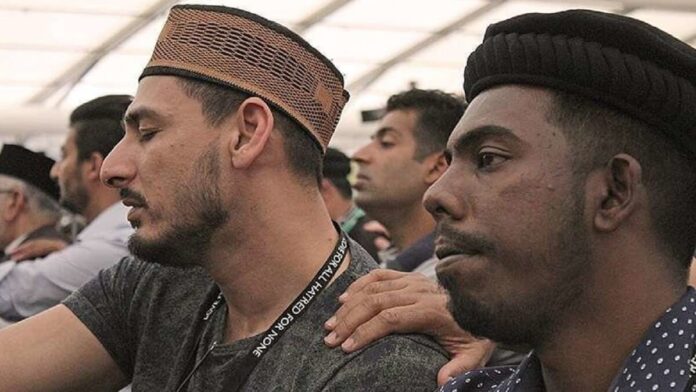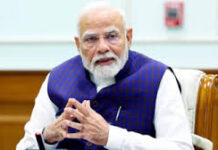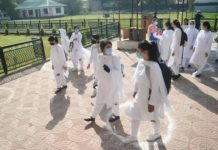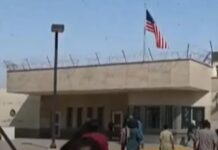Chakwal, June 11: In a serious violation of basic human rights and religious freedom, three members of the Ahmadiyya community in Pakistan Punjab’s Chakwal district have been detained, to prevent them from participating in the sacrificial slaughter of animals on Eidul Azha, as under Pakistani law the community is considered non-Muslim.
According to an administrative order, the three were detained “to avoid any likelihood of breach of peace”.
In a statement, the minority community claimed that the three members were detained from Chakwal under section 3 (1) of the Punjab Maintenance of Public Order Ordinance, 1961 and were being held in the Jhelum jail in the neighbouring district.
They were the community’s Chakwal district president Malik Naveed Ahmad, Malik Riaz Ahmad and secretary general Malik Tahir Ahmad, Ahmadiyya community spokesperson Aamir Mahmood said.
Chakwal Deputy Commissioner Quratul Ain Malik issued the order which stated that the three people might cause “deterioration for law and order situation in the area.”
The government order also described the three as “miscreants” and added that the district police officer was to prevent them from “their unlawful activities and acting in a manner prejudicial to the public safety”.
According to the community, the three community members were called on Monday for a meeting with the DSP, SHO and Choa Saidan Shah’s assistant commissioner regarding Eidul Azha.
The Ahmadiyya community members were called to the meeting after reports said they had plans to slaughter animals on Eidul Azha.
The statement from the community suggested that there were indeed such plans and the community refused to give up on the idea of slaughtering animals on Eid.
“Immense pressure was placed on the Ahmadiyya delegation not to perform the qurbani. Furthermore, they were told to submit a surety bond stating that neither they nor any other Ahmadi in the district will perform qurbani,” said the statement by Aamir Mahmood.
The minority community delegation insisted that the law did not bar them from performing the Eid rite.
The members also quoted the recent Supreme Court “judgement in the case of Tahir Naqash etc vs The State etc authored by Justice Mansoor Ali Shah where it is clearly stated that Ahmadis has the right to practice their faith within the confinement of four walls.”
The complainants were allowed to leave. However, the community’s delegation members were “illegally held in custody till the evening”. Later, they were “detained under for a period of 30 days in the Jhelum jail,” the community claimed.
Chakwal DC Quratul Ain Malik’s order also mentioned the meeting where the District Intelligence Committee recommended that the three persons should “be detained to prevent society from their harmful activities”.
The Ahmadiyya movement is regarded as heterodox by the majority of Sunni and Shi’a Pakistanis, and Ahmadiyya Muslims have been marginalized, discriminated against in various ways, and sometimes violently oppressed. After decades of agitation on the part of the Jamaat-e-Islami and other Islamist groups, Ahmadis were categorized as a non-Muslim minority in national law in 1974—a view held by the majority of Pakistanis today—and constitutional reforms in 1973 barred an Ahmadi from holding the presidency.
The Ahmadi community faces constant oppression and discrimination in eligibility to hold government positions, in contesting elections, in their businesses, and in destruction of their homes and places of worship. Ahmadi Muslims are prevented by law from publishing and possessing their core religious texts, crucially including the Holy Quran. On January 10, 2020, the Punjab Assembly’s Special Committee decided to ban the Ahmadi newspaper, Al-Fazl. This, in a state and a country where dozens of terrorist organisations openly publish multiple magazines.
The National Commission for Minorities (NCM), constituted in May 2020 has no member from the Ahmadi community.
Under the Pakistan Penal Code (PPC), fundamental religious rights are denied to Ahmadis in Pakistan. Ahmadis are prohibited from self-declaration as a Muslim, to make azaan (prayer call), from paying zakat (alms), from observing fast during Ramzan, and from making pilgrimage to Mecca.
According to the law, Ahmadis cannot hold government office without publicly denouncing Mirza Ghulam Ahmad, the founder of the Ahmadi community.
Ahmadis are frequent victims of terrorism and incarceration as seen in the 1953 Lahore riots, 1974 Anti-Ahmadiyya riots and May 2010 attacks on Ahmadi mosques in Lahore.
Since 1985 most Ahmadiyyas have not participated in an election. Casting a vote would require them to explicitly denounce themselves as non-Muslims.
Ahmadis represent around 0.2 percent of Pakistan’s 241 million population.








